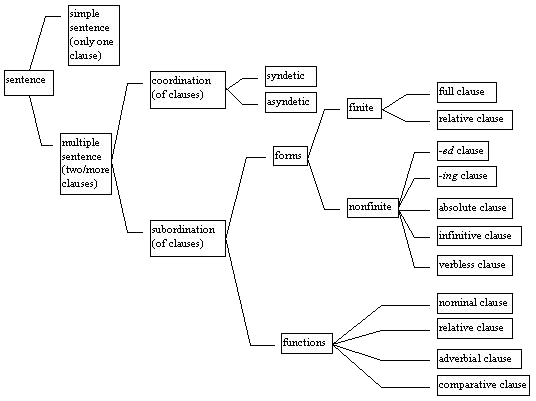- From: <editor@content-wire.com>
- Date: Mon, 4 Feb 2008 11:56:50 +0700
- To: "Golda Velez" <gv@btucson.com>, <semantic-web@w3.org>
- Message-ID: <018001c866ea$69653540$b30a010a@Paola>
Golda I am still learning about RDF, Let me give you my take, so that others may correct me. Based on what I read so far, I believe that RDF is not designed to support complex statements of natural language, although I am sure ways around can be found, albeit 'not elegant' Most natural languages have developed to support sophisticated reasoning and logic They have done by allowing for two classes 'simple clauses' (subject predicate object), which can stand alone, and can be supported by RDF nicely, and 'complex clause's, which are formalisms to express more structured and less linear logical relationships, they depend on a simple clause to make sense, like the examples that you give (the second part of your sentence is a relative clause, either coordinate or subordinate see the diagram below http://papyr.com/hypertextbooks/grammar/cmplx1.htm <Which> leads to is a subordinate, relative clause, meaning: cannot stand on its own, it needs another simple sentence to hang from. Such structure is not supported by RDF So, If I were obliged to use RDF to do this, I would use - with a chain of triples, and assign arbitrary values to each triple <which> could be a predicate, for example in current RDF syntax, because predicates can be 'absolutely antying'. From a design and natural language perspective, IMHO this is not robust nor elegant nor efficient or allow RDF to express n'tuple (not just three values statements) assigning as many predicates and as many objects as your sentence statement requires - equally messy. My suggestion would be: augment and evolve RDF syntax to support subordinate clauses more complex grammatical structures as illustarted above This can be easily and quickly done, and would solve the problem we just need to update the RDF spec a bit If I have to use the grammatical structure of a simple sentence to expresse complex sentences, is like trying to express modern literature using the language spoken by Neanderthal Nothing wrong with it, but not adequate to the evolutionary stage Please let me know where I am wrong cheers Paola Di Maio > ------------------ > How do I find the right vocabulary to express this statement? And for > others > to agree and disagree with it, what is the best way to give it its own URI > or > other identifier so other statements can be made about this statement? > > I think that in the mucky real world, making and responding to statements > of > this type of complexity would be useful. Should we just stick to English > or > our other native tongue? > > --Golda > > > -- > ~~~~~~~~~~~~~~~~~~~~~~~~~~~~~~~~~~~~~~~~~~~~~~~~~~~~~~~~~~~~~~ > Golda Velez 520-440-1420 http://goldavelez.com > what I do: Tucson Superblog http://btucson.com > Search software http://webglimpse.net > Web hosting http://iwhome.com > > "Help organize the world - index your own corner of the web!" >
Attachments
- image/gif attachment: subord.gif

Received on Monday, 4 February 2008 04:50:00 UTC